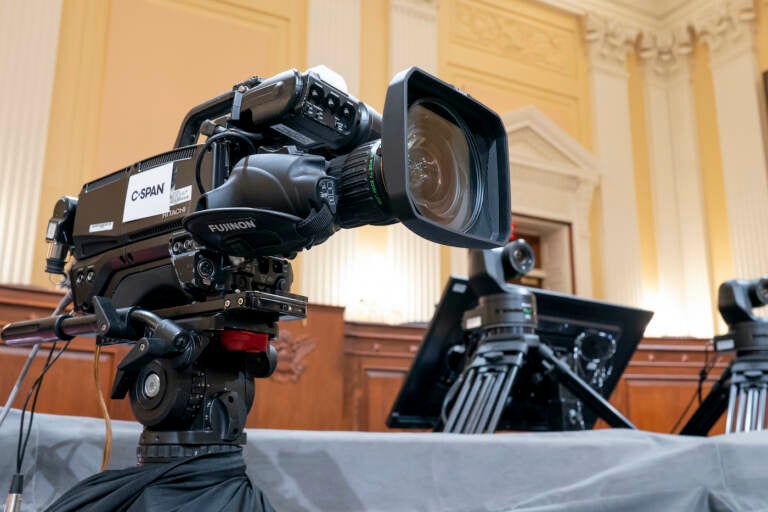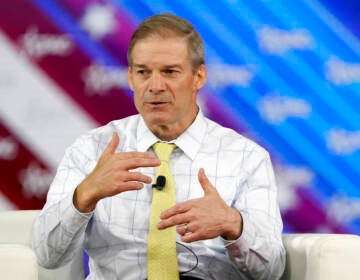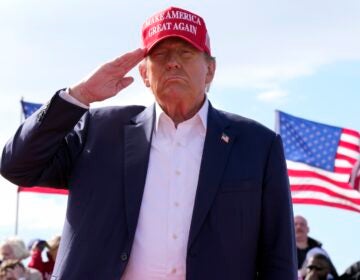Capitol attack’s full story: Jan. 6 panel’s chilling details
The Jan. 6, 2021, insurrection at the U.S. Capitol played out for the world to see.

Television crews and technicians prepare the Cannon Caucus Room for Thursday night's hearing by the House select committee investigating the attack of Jan. 6, 2021, at the Capitol in Washington, Tuesday, June 7, 2022. (AP Photo/J. Scott Applewhite)
The Jan. 6, 2021, insurrection at the U.S. Capitol played out for the world to see, but the House committee investigating the attack believes a more chilling story has yet to be told— about the president and the people whose actions put American democracy at risk.
With personal accounts and gruesome videos the 1/6 committee expects Thursday’s prime-time hearing to begin to show that America’s tradition of a peaceful transfer of presidential power came close to slipping away. It will reconstruct how the president, Donald Trump, refused to concede the 2020 election, spread false claims of voter fraud, and orchestrated an unprecedented public and private campaign to overturn Joe Biden’s victory.
The result of the coming weeks of public hearings may not change hearts or minds in politically polarized America. But the committee’s year-long investigation with 1,000 interviews is intended to stand as a public record for history. A final report aims to provide an accounting of the most violent attack on the Capitol since the British set fire in 1814, and ensure it never happens again.
“This is not a game,” said Steven Levitsky, a Harvard professor and co-author of “How Democracies Die,” who has written extensively on the world’s democratic governments.
“We suffered an assault on our democracy the likes of which none of us have seen in our lifetime.”
Emotions are still raw at the Capitol 17 months after Trump sent his supporters to Congress to “fight like hell” for his presidency. That was on a Wednesday, two months after the election, a traditionally celebratory if ho-hum day when Congress is tasked with certifying the November results.
Security will be tight for the hearings. Law enforcement officials are reporting a spike in violent threats against members of Congress.
Against this backdrop, the committee will try to speak to a divided America, ahead of the fall midterm elections when voters will decide which party controls the Congress. Most TV networks will carry the hearings live, Fox News will not.
“We’re going to tell the story of a conspiracy to overturn the 2020 presidential election,” says Rep. Jamie Raskin, D-Md., a member of the committee.
“You really have to go back to the Civil War to understand anything like it.”
First up will be wrenching accounts from police who engaged in hand-to-hand combat with the mob, with testimony from U.S. Capitol Police officer Caroline Edwards, who was seriously injured in the melee. Also appearing Thursday will be documentary maker Nick Quested who filmed the extremist Proud Boys storming the Capitol. Some of that group’s members have since been indicted as have some from the Oath Keepers on rare sedition charges over the military-style attack.
In the weeks ahead, the panel is expected to detail Trump’s public campaign to “Stop the Steal” and the private pressure he put on the Department of Justice to reverse his election loss — despite dozens of failed court cases and his own attorney general attesting there was no fraud on a scale that that could have tipped the results in his favor.
“It’s going to be there for the permanent record, and I think that’s important for history,” said Barbara Comstock, a former Republican congresswoman from Virginia.
The panel, made up of nine lawmakers, faced obstacles from its start. Republicans blocked the formation of an independent body that could have investigated the Jan. 6 assault the way the 9/11 Commission probed the 2001 terror attack.
Instead, House Speaker Nancy Pelosi ushered the creation of the 1/6 panel through Congress over the objections of Senate Republican Leader Mitch McConnell. She rejected Republican-appointed lawmakers who had voted Jan. 6 against certifying the election results, choosing her own preferred members to serve and naming civil rights advocate Rep. Bennie Thompson, D-Miss., as chairman.
The Jan. 6 committee’s lopsided composition of seven Democrats and two Republicans, Liz Cheney of Wyoming and Adam Kinzinger of Illinois, outspoken Trump critics now risking their political futures on this work.
After a year-long investigation, the story the committee aims to tell is still unfolding.
By many measures, the attack was set in motion months earlier, soon after Election Day, when Trump falsely claimed the voting was rigged and refused to concede once Biden was declared the winner.
The proceedings are expected to introduce Americans to a cast of characters, some well known, others elusive, and to what they said and did as Trump and his allies tried to reverse the election outcome.
The public will learn about the actions of Mark Meadows, the president’s chief of staff, whose 2,000-plus text messages provided the committee with a snapshot of the real-time scramble to keep Trump in office. Of John Eastman, the conservative law professor, who was the architect of the unsuccessful scheme to convince Vice President Mike Pence to halt the certification on Jan. 6. Of the Justice Department officials who threatened to resign rather than go along with Trump’s startling proposals.
Lawmakers have also been caught up in the probe, including House GOP Leader Kevin McCarthy, who defied the committee’s subpoena requests for testimony. Trump’s daughter Ivanka Trump, who urged her father to call off the rioters, appeared privately before the committee.
The Justice Department has arrested and charged more than 800 people for the violence that day, the biggest dragnet in its history.
Trump has dismissed the entire investigation as illegitimate. The committee cannot charge him or anyone else. It’s jurisdiction allows it only to refer its findings to the department, which is investigating.
Many Republicans are poised to defend Trump in the weeks ahead. Republican Rep. Jim Jordan of Ohio, who defied the panel’s subpoena for an interview, said in a statement the committee’s true aim is to convince Americans that “conservatives are to blame for the events of that day.”
Yet, as Trump weighs another run for the White House, other Republicans wonder quietly if the committee hearings will have an impact on the public or if Jan. 6 will simply be forgotten.
Levitsky, the professor, said Americans have not had much experience watching their democracy at risk.
“One weakness that Americans have in in defending our democracy, is that we take it for granted,” he said. “We’re not aware of the warning signs,” he said.
He said the committee’s report should be taught in U.S. civics and history textbooks for years to come to inform Americans and bring them together. “That’s how democracy gets saved,” he said.
—
Associated Press writers Farnoush Amiri, Kevin Freking and Michael Balsamo contributed to this report.
WHYY is your source for fact-based, in-depth journalism and information. As a nonprofit organization, we rely on financial support from readers like you. Please give today.






